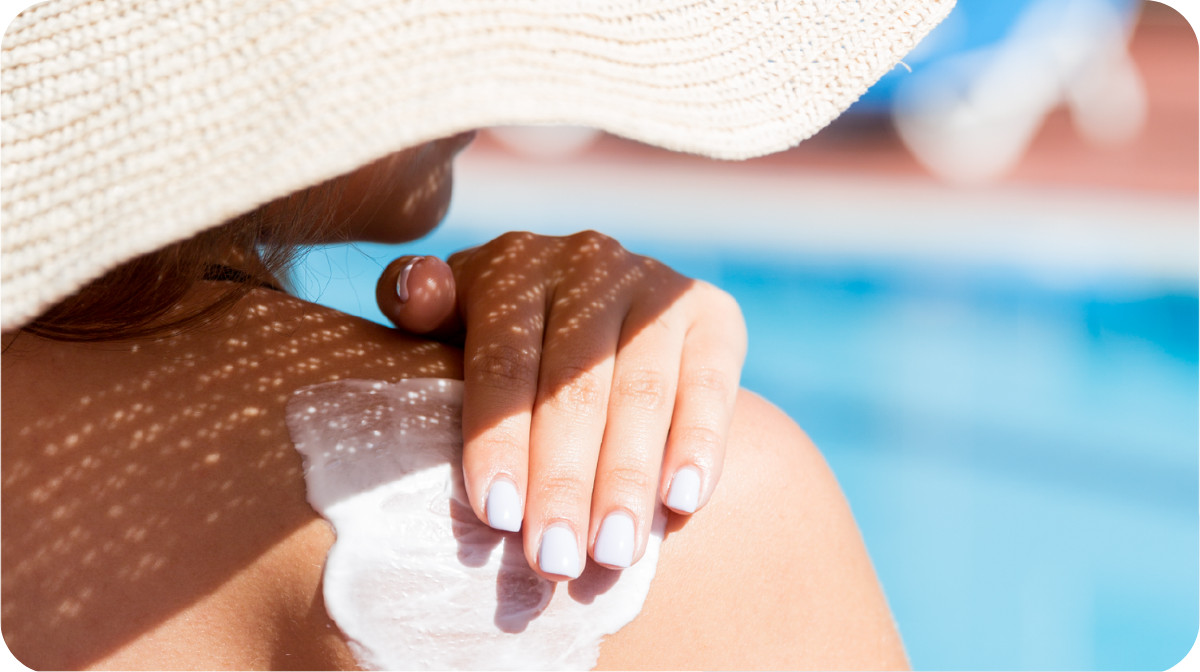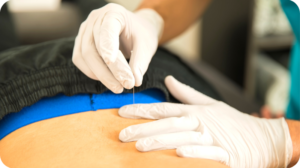Summer’s here and it’s time to break out the shorts, swimsuits, and flip-flops. As you get ready to take enjoy longer days and warmer weather, don’t forget the sunscreen.

That’s not just a matter avoiding a sunburn; in the last decade, the incidence of skin cancer has risen more than 30 percent. Unprotected sun exposure also ages skin more quickly, causing premature wrinkling and discoloration. A layer of sunscreen or sunblock applied every time you go out in the sun is an easy way to reduce your risk.
The difference between sunscreen and sunblock lies in the ingredients. Sunscreen uses chemicals to filter UV rays in light; sunblock uses ingredients that physically block those rays. Sunblock can be gentler on sensitive skin, but sunscreens are usually easier and more comfortable to apply. That’s why sunscreens are by far more common and popular. At one time, each of these blocked a different type of UV ray. These days, it’s easy to find a “full-spectrum” sunscreen that blocks both UVA and UVB rays.
The more confusing issue when it comes to sunscreen is SPF. Here’s a quick and basic explanation (learn more at the FDA’s SPF page, here).
SPF Decoded
SPF is meant to be an-at-glance tool for the consumer, but is commonly misunderstood. Even many health and skin care experts disagree. SPF stands for “Sun Protection Factor.” Contrary to popular misconception, a higher SPF doesn’t guarantee exponentially more protection (the difference between SPF 15 and SPF 50 is about 93 percent versus 97 percent of UV rays blocked—no sunscreen blocks all UV rays).
Technically, SPF is the multiple of how quickly your skin would burn if left unprotected. For instance, if your unprotected skin would burn after 10 minutes of direct sun exposure, applying an SPF 30 sunscreen would theoretically protect it for 300 minutes under the same sun exposure.
Dermatologists emphasize that the issue is really amount of exposure. For instance, morning sunlight is far less powerful than midday exposure. That’s why the American Academy of Dermatology Association promotes reapplying sunscreen at least every two hours regardless of SPF. The more frequently, the better. You should also reapply after swimming, unless your sunscreen is a sports formulation specifically meant to hold up while swimming.
The other issue that radically affects SPF and frequency of reapplication is skin type. Dermatologists determine skin type using the Fitzpatrick Scale, a tool that rates skin pigmentation from one (almost pure white and quick-to-burn) to six (deep ebony, extremely resistant to burn). The lower the number, the more frequently you should reapply sunscreen.
Sunscreen Guidelines
Although understanding the science behind sunscreen is helpful, the rubber hits the road when you’re standing in an aisle of your local store looking at a shelf full of options. Here’s some simple advice for how to choose the right product for you.
- Higher SPF is better. Dermatologists recommend buying at least an SPF 30.
- Choose full-spectrum. Any product labeled “full-spectrum” protects against both UVB and UVA rays.
- Match lifestyle. Are you a swimmer? Buy a “sport” sunscreen meant to withstand sweating and even time spent swimming. Dry skin? Choose a moisturizing sunscreen with humectants that will slow down how quickly your skin absorbs it. Non-comedogenic versions are formulated for oily skin, specifically to avoid blocking pores or acerbating acne.
Buying the correct sunscreen is only half the battle. How you use it is the other half.
- Apply liberally. Studies have shown most sunscreen users apply 50 percent or less of the proper amount. Follow the manufacturer’s directions and lay it on thick.
- Reapply. This is a most common error sunscreen users make; the sunscreen needs to be reapplied on schedule. More frequently is always better. Keep in mind that the clock starts ticking when you apply the sunscreen (that’s when it begins breaking down and being absorbed by your skin).
- Read labels. The last few years has seen a widespread rise in concern in the medical and scientific communities about many ingredients commonly used in sunscreen. The FDA is currently investigating a list of these. For the moment, you would be wise to avoid products containing nanoparticles (watch for the word “micronized”), oxybenzone, benzenes, and PABA. If you have particularly sensitive skin, choose a sunscreen without fragrances or preservatives.
- Check the expiration date. If you haven’t used your sunscreen since the previous summer, check the expiration date. Sunscreens regularly last three years or more, but they can expire and will be less effective once they pass that date.
Lastly, as much as we think of sunscreen as a summertime product, the sun shines all year round. If you want to keep your skin as healthy as possible—and looking its best for as long as you can—make sunscreen application a part of your daily body care ritual. You’ll have no problem finding non-greasy moisturizing sunscreens that are easy to apply and imperceptible once applied.
Share some love if you like this post!







